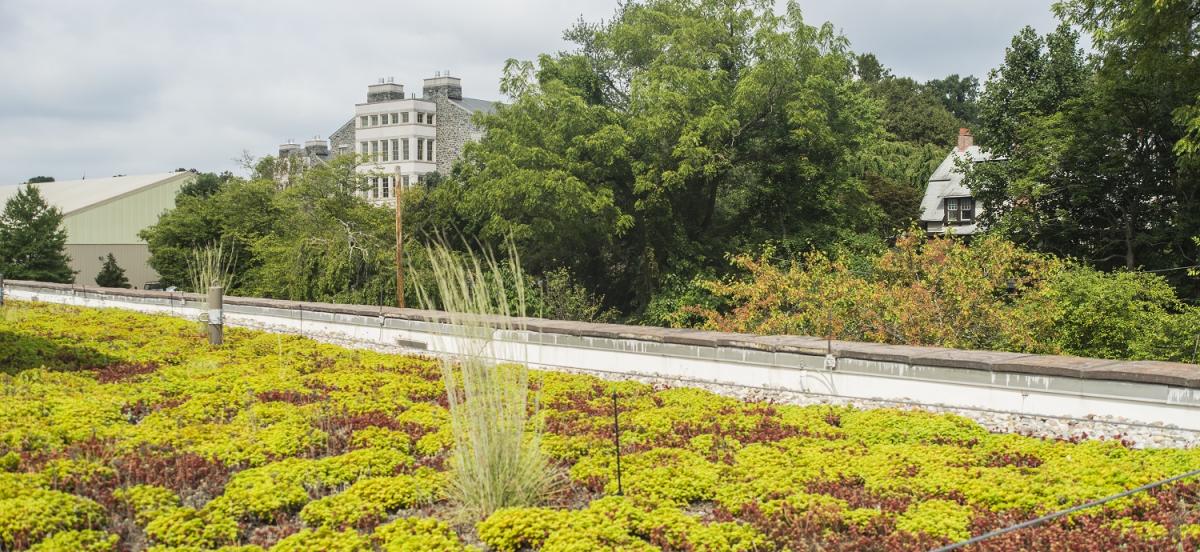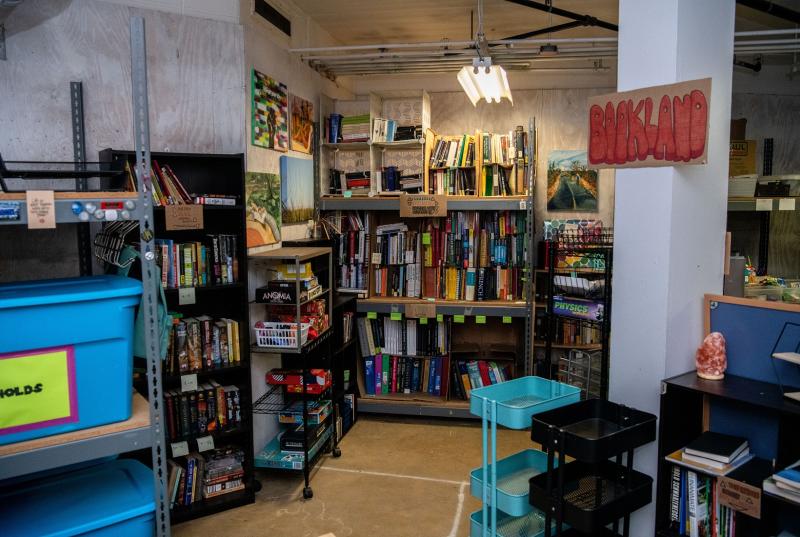Sustainability at Haverford

Green roof on top of Kim and Tritton Hall with sedum plants. Photo: Patrick Montero.
Details
Haverford College engages in a wide range of sustainability projects to reduce its carbon footprint and benefit the environment.
From green roofs to electric vehicle chargers, Haverford has implemented a wide range of sustainability measures across campus to reduce our college’s carbon footprint and serve as a leader in environmental stewardship. In 2021, we were ranked #4 on the list of top ten zero-waste college campuses created by the Post-Landfill Action Network. Haverford also earned a silver rating from the Sustainability Tracking, Assessment & Rating System (STARS) in 2020. Although there are a wide diversity of sustainability initiatives on campus, they are not always easy to notice or well-known. Here, I would like to specifically highlight some of the sustainability projects that the Arboretum engages in to lead us to a greener future.
As the stewards of the campus’ trees and grounds, the Arboretum has played an integral role in various sustainability initiatives on campus and works closely with various other organizations, including the Committee for Environmental Responsibility, to initiate these projects. If you walk around campus, you might have not noticed our green roofs, which are located on top of Stokes Hall and Kim & Tritton. The Stokes building features a 5,700 square foot green roof! Green roofs, also known as eco-roofs, are roofs that contain a growing medium and support a layer of vegetation. These green roofs can help mitigate the heat island effect, which occurs when buildings and other infrastructure absorb and re-emit the sun’s heat more than natural landscapes. The Arboretum also cares for various rain and pollinator gardens located on campus, including the gardens located behind VCAM and next to the Whitehead Campus Center.
Additionally, Jennie Kelly, the Arboretum Program Coordinator, is engaged in various sustainability efforts on campus, including the (RE)use Store. Students can donate unwanted items to the (RE)use Store, such as mini-fridges and lamps, which can then find a new home with other students who need these items. Not only does the (RE)use Store help reduce our campus’ carbon footprint, but it also provides students with free access to various dorm supplies and items they may need. According to Jennie Kelly, the (RE)use Store has had over 400 visitors this school year and has given out more than 2,000 items to the campus community.

In addition to these sustainability initiatives led by the Arboretum, Haverford has implemented a wide range of other sustainability measures. These include sourcing local and sustainable foods in the Dining Center (DC), installing energy-efficient lighting systems, and initiating measures to conserve water and reduce stormwater runoff.
Did you know that Haverford’s current sustainability efforts are guided by its Sustainability Strategic Plan, which was developed by students, faculty, and staff on the Council on Sustainability and Social Responsibility (CSSR)? This strategic plan proposes a four-pronged strategy by which Haverford can have a meaningful positive impact on society and the environment both at the global and local levels. This strategy includes educating students on sustainability and empowering them to enact change; using the college’s unique natural, physical, and communal assets to connect curricular and co-curricular programs with local issues of sustainability; accelerating Haverford’s commitment to carbon neutrality; and providing opportunities for students and the college to address urgent sustainability challenges through civic engagement, advocacy, and career and professional opportunities.
Through this plan, Haverford aims to serve as a model of environmental stewardship and demonstrate our commitment to social responsibility. Although Haverford has implemented a wide range of sustainability projects, there is still much more that Haverford can do to reduce our carbon footprint and demonstrate our commitment to supporting the planet and the people that inhabit it. Although Earth Month just finished, it is important to remember that the threat of climate change is omnipresent, and we must never stop striving to fight it both individually and collectively.
If you’d like to learn more about Haverford’s sustainability initiatives, please come join us on Friday, May 27, from 11:00 AM - 12:00 PM for a sustainability tour around campus with Jesse Lytle, Claudia Kent, and Jennie Kelly, who all work on sustainability projects on campus! Please register for the tour here. You can also take a virtual sustainability tour of campus by visiting this link, and you can read more about Haverford’s commitment to sustainability here.



